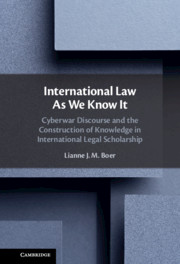 International Law As We Know It
International Law As We Know It Published online by Cambridge University Press: 01 October 2021
This last chapter returns to the main point of this book: to propose a new “way of seeing” (Johns) international legal knowledge construction. It puts forward three conclusions. First, the “mundane” (Johns) only comes into view by changing the way we read or listen. This entails a willingness to attend to international law’s texts; to spend time with them and to ‘stay seated’ throughout the attempt at reading or hearing them differently. Second, considering others’ knowledge practices this closely spills over into a closer consideration of one’s own. This is in fact what follows from the book's sociological approach, and by showing what forms this (self-)reflection may take on, I argue that the knowledge practices of those involved in the cyberwar discourse are not limited to doctrinal work. Third, looking at international legal scholarship in this way also reveals the presence of its writers. In writing about international law its scholars distance themselves from it; and in so doing we come to see that there is, in fact, a writer at work (as also discussed by Pierre Schlag). What results is a view of scholars as engaged in ‘writing law’ in a very literal, textual, tangible sense.
To save this book to your Kindle, first ensure [email protected] is added to your Approved Personal Document E-mail List under your Personal Document Settings on the Manage Your Content and Devices page of your Amazon account. Then enter the ‘name’ part of your Kindle email address below. Find out more about saving to your Kindle.
Note you can select to save to either the @free.kindle.com or @kindle.com variations. ‘@free.kindle.com’ emails are free but can only be saved to your device when it is connected to wi-fi. ‘@kindle.com’ emails can be delivered even when you are not connected to wi-fi, but note that service fees apply.
Find out more about the Kindle Personal Document Service.
To save content items to your account, please confirm that you agree to abide by our usage policies. If this is the first time you use this feature, you will be asked to authorise Cambridge Core to connect with your account. Find out more about saving content to Dropbox.
To save content items to your account, please confirm that you agree to abide by our usage policies. If this is the first time you use this feature, you will be asked to authorise Cambridge Core to connect with your account. Find out more about saving content to Google Drive.